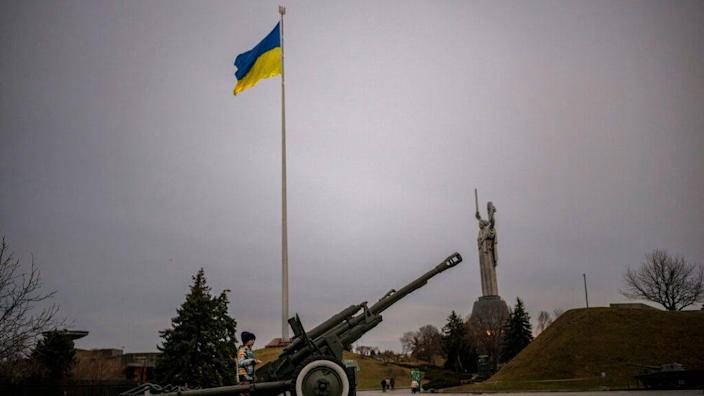
Welcome to Wednesday’s Overnight Energy & Environment, your source for the latest news focused on energy, the environment and beyond. Subscribe here: thehill.com/newsletter-signup.
Today we’re looking at the environmental implications of Russia’s invasion of Ukraine, the United Nations’ treaty on plastics and Joe Manchin suggesting a lifeline for Build Back Better’s climate provisions.
For The Hill, we’re Rachel Frazin and Zack Budryk. Write to us with tips: rfrazin@thehill.com and zbudryk@thehill.com. Follow us on Twitter: @RachelFrazin and @BudrykZack.
Let’s jump in.
Russia invasion holds ‘environment hostage’


Russia is targeting a number of sites in its invasion of Ukraine that could cause short- and long-term environmental disasters if they are destroyed or damaged.
Russian forces that began an invasion of Ukraine on Thursday have targeted an oil refinery near Kyiv, forcing its shutdown and destroying its entire fuel supply. Ukraine also intercepted a missile targeting the Kyiv Reservoir, which if successful could have caused severe flooding in the capital city.
Kyiv is divided by the Dnipro River, a 1,400-mile waterway that also bisects most of the country.
“If that dam was damaged, Kyiv would be flooded, and there would be a humanitarian crisis … and it would cause a sort of cascade effect on other locks and dams along the Dnipro,” said a representative for the Ukrainian Volunteer Journalists Initiative (UVJI), a collective of local volunteers who maintain a daily, fact-checked record of casualties and damage.
What else? Russia has also bombarded the Shebel oil refinery just outside of Kyiv, causing a fire that UVJI estimated caused billions of dollars in environmental damages. The Shebel refinery, one of just two oil refineries nationwide, was the country’s second-biggest diesel and gasoline producer until officials shut it down Saturday.
“It will burn for a long time. The environmental damage will be enormous,” Anton Gerashchenko, an adviser to Ukraine’s Ministry of Internal Affairs, said Sunday.
Ukrainian officials also reported over the weekend that Russian forces blew up a natural gas pipeline in Kharkiv, the nation’s second-biggest city, but the Gas Transmission System Operator of Ukraine said no disruption to service has been detected.
In general, the environmental threat from the invasion is “enormous,” said another UVJI representative, because “we have a lot of such strategic objects. We are a big industrial country, and there are a lot of these … risk zones.”
Read more about the environmental risks here.
Countries pledge to plastics agreement


Heads of state and environment ministers from 175 countries endorsed a resolution on Wednesday to develop a legally binding pact to address a global plague of plastic pollution.
The world leaders signed the “End Plastic Pollution” resolution at the United Nations Environment Assembly (UNEA-5) in Nairobi, where they pledged to address the full life cycle of plastic – including its production, design and disposal – in an agreement by 2024. The treaty would include alternatives such as the design of reusable and recyclable materials, while increasing accessibility to necessary technologies through international collaboration, according to the resolution.
“Against the backdrop of geopolitical turmoil, the UN Environment Assembly shows multilateral cooperation at its best,” Espen Barth Eide, president of UNEA-5 and Norway’s minister for climate and the environment, said in a statement. “Plastic pollution has grown into an epidemic. With today’s resolution we are officially on track for a cure.”
The resolution, which is based on three initial drafts, establishes an Intergovernmental Negotiating Committee (INC) that will begin working on the text of the legally binding agreement this year. The United Nations Environment Program (UNEP) said it will hold a forum open to all stakeholders in conjunction with the INC by the end of 2022, to share best practices and knowledge.
“Today marks a triumph by planet earth over single-use plastics,” Inger Andersen, executive director of UNEP, said in a statement. “This is the most significant environmental multilateral deal since the Paris accord. It is an insurance policy for this generation and future ones, so they may live with plastic and not be doomed by it.”
Read more from The Hill’s Sharon Usadin here.
GET ON THE LIST
Stay ahead of the news cycle with The Hill’s new Evening Report, featuring the day’s top stories and a look ahead to tomorrow.
Manchin proposes scaled down BBB


Sen. Joe Manchin (D-W.Va.), who torpedoed President Biden‘s Build Back Better agenda at the end of last year, on Wednesday laid out a dramatically scaled down version that he says he could vote for under the special budget reconciliation process.
Manchin said he could support a reconciliation package that reforms the tax code and lowers the cost of prescription drugs if the money raised is split between spending on new climate change proposals and deficit reduction and fighting inflation.
The West Virginia senator clarified he hasn’t made any formal counterproposal to the White House but is sketching the outlines of a proposal that he could support along with the rest of the Senate Democratic Caucus.
He suggested spending on an array of initiatives to fight climate change would likely unify his Democratic colleagues.
“Half of that money should be dedicated to fighting inflation and reducing the deficit,” he said. “The other half you can pick for a 10-year program, whatever you think is the highest priority and right now it seems to be the environment – and that’s a pretty costly one – would take care of it.”
But he insisted that he’s not engaged in any formal talks with the White House.
“Everybody knows pretty much where I am,” he said. “This is nothing new. What I just told you all … is nothing new. I’ve been saying it for a year.”
Read more from The Hill’s Alexander Bolton.
QUOTES OF NOTE, SOTU EDITION
Key E&E quotes from President Biden’s first State of the Union address.
“The VA is pioneering new ways of linking toxic exposures to diseases, already helping more veterans get benefits,” Biden said, following an announcement that the Department of Veterans’ Affairs was expanding disability compensation to nine cancers related to toxic chemical exposure.
Read more from The Hill’s Jordan Williams.
–
“Let’s provide investments and tax credits to weatherize your homes and businesses to be energy efficient and get a tax credit for it; double America’s clean energy production in solar, wind and so much more; lower the price of electric vehicles, saving another $80 a month that you’re not going to have to pay at the pump,” Biden said, framing the push for climate benefits from his stalled agenda as cutting costs for consumers and fighting inflation.
–
“America will lead that effort, releasing 30 million barrels from our own Strategic Petroleum Reserve. And we stand ready to do more if necessary, united with our allies,” Biden said, after the U.S. joined with other nations to release a total of 60 million barrels from their oil reserves.
WHAT WE’RE READING
-
Americans agree climate change is an issue – but differ on what to do (NBC News)
-
Coal giant Peabody announces joint venture focused on solar power and energy storage (St. Louis Post-Dispatch)
-
Whistleblowers Reveal EPA Officials Who Downplayed Hazards (The Intercept)
-
Crop insurance comes to grips with climate change (E&E News)
-
Hong Kong’s tough COVID curbs hobble its green finance ambitions (Reuters)
ICYMI
And finally, something offbeat but on-beat: Making a fashion statement
That’s it for today, thanks for reading. Check out The Hill’s energy & environment page for the latest news and coverage. We’ll see you Thursday.
We want to hear from you! Take our newsletter survey to provide feedback on our offerings.




